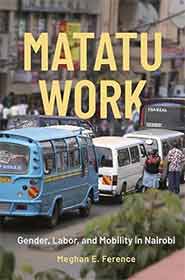
Text from the publisher:
James Currey 2024, 208 p.
Focuses on the lives and labour of the men and women who work in Nairobi’s publicly operated, privately owned minibus taxis, matatu.
How can mass transit systems be designed in ways that respond to the needs of urban citizens in the midst of an impending climate crisis? What strategies can transport workers employ as they adapt to shifts in the global economy? This book focuses on the lives and labour of the men – and, importantly, women – who work in Nairobi’s publicly operated, privately owned minibus taxis, matatu, to examine questions about access to urban public space, gendered regimes of work, and neoliberalism that lie at the heart of debates on the future of African cities.
Providing an in-depth view of workers’ routines and the unwritten rules that govern informal transport sectors, this book is an ethnography of Nairobi’s popular transportation workforce, with a focus on strategies that circulate both economic (cash, vehicle investments) and symbolic capital (new linguistic codes, music, and elements of style) in ways that keep the city moving. In the face of a rapidly changing urban and global landscapes Matatu Work considers the ways in which urban transport has provided expression of marginalized perspectives as well as decolonial struggles. Shedding new light on transportation practices and urban growth, the book invites the reader to take another look at the ways in which public transportation is not just an urban solution to practical problems of space and movement, but also how it is a place of sociability, performance, protest, and consumption and central to the making of sustainable cities.
Topics: urban travel